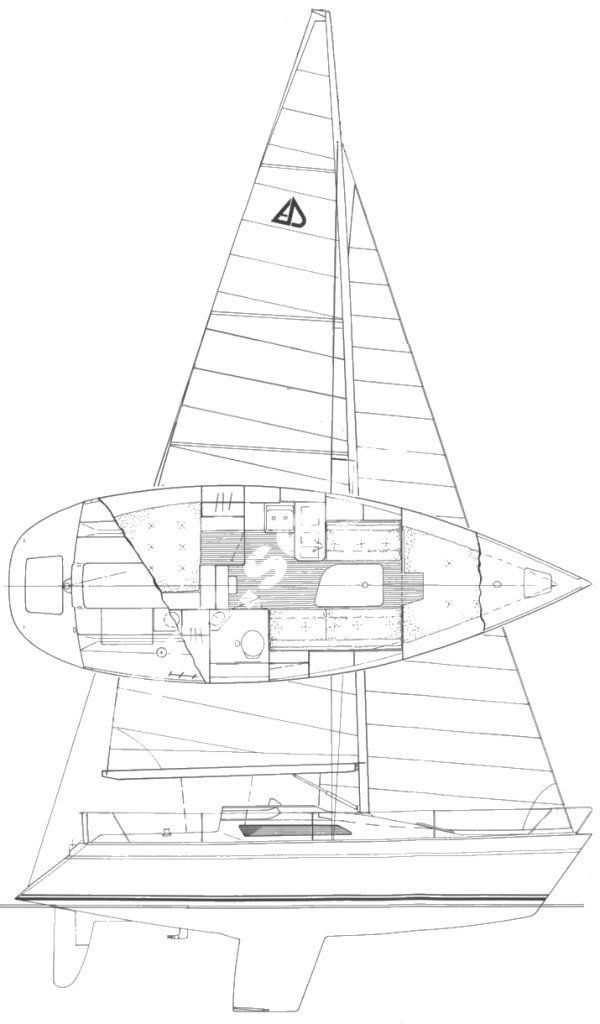The Artina 29 is a notable Finnish-built monohull, conceived as an agile and reliable cruiser capable of offshore ventures despite its compact size. Designed by the respected naval architect Hans Groop, this sailboat embodies a design philosophy focused on practical, well-built vessels. Constructed by Artekno OY, a builder with a reputation for durable fiberglass boats, the Artina 29 offers a blend of performance and surprising interior volume for its length.
Artina 29 Information, Review, Specs

- Make
- Model
- Number Built
- Production Year(s)
- 1988 - ??
History and Design
The production of the Artina 29 commenced in 1988 by Artekno OY, a Finnish company known for its robust fiberglass construction methods. Artekno OY’s manufacturing ethos during this period emphasized sturdy and reliable vessels suitable for both racing and comfortable cruising, a philosophy evident in the Artina 29's design. Notably, Artekno OY built the Artina 29 for approximately two years before production transitioned to Swing Yachts, where it was subsequently rebadged as the Artina 291. While the standard rig for the Artina 29 is a fractional sloop, some examples were also fitted with masthead rigs, offering a degree of variation during its initial production run. Both the hull and deck utilized a sandwich construction, a design choice intended to enhance the indoor climate.
Sailing Performance and Handling
Despite its relatively modest length overall of just over 28 feet, the Artina 29 is described as an agile and reliable sailboat with surprising offshore capabilities. Its handling characteristics are generally well-regarded, with one assessment noting its relative speed performance as being faster than 88% of similar sailboat designs. The boat's design emphasizes a balanced feel and predictable behavior in varying sea states, contributing to its reputation as a dependable cruiser.
Accommodations and Layout
The Artina 29 is often referred to as a "space miracle" for its ability to offer a surprisingly roomy interior for its size. The design typically incorporates two cabins and provides sleeping accommodations for up to five persons. The galley, a central feature of the interior, is equipped with a gas stove featuring an oven and two burners, a refrigerator, and double sinks, suggesting a practical setup for preparing meals onboard. The use of sandwich construction for both the hull and deck not only contributes to the boat's structural integrity but also plays a role in improving the interior climate, aiding in insulation. While specific details on materials and finish quality are limited, the overall design suggests a functional and comfortable layout, typical for a well-regarded Finnish cruiser of its era.
Measurements
Construction & Hull
- Construction Material
- Fiberglass (Solid)
- Hull Type
- Monohull Sailboat
- Keel Type
- Fin
- Rudder
- 1x Spade
- Ballast
- 2866 lbs (Lead)
- Displacement
- 6834 lbs
- Water Capacity
- -
- Fuel Capacity
- -
Engine
- Engine Make
- Volvo Penta
- Engine Model
- —
- Engine Type
- —
- Engine HP
- —
- Engine Count
- 1
- Drive Type
- —
- Fuel Type
- Diesel
Rig & Sails
- Rig Type
- Fractional Sloop
- P (Main Luff)
- 36.74 ft
- E (Main Foot)
- 12.3 ft
- I (Foretriangle Height)
- 33.2 ft
- J (Foretriangle Base)
- 10.17 ft
- Forestay Length (est)
- 34.72 ft
- Main Sail Area
- 225.95 sqft
- Foretriangle Sail Area
- 168.82 sqft
- Total Sail Area (Reported)
- 269 sqft
- Total Sail Area (Calc)
- 394.77 sqft
Dimensions
- LOA
- 28.54 ft
- LWL
- 24.28 ft
- Beam
- 9.74 ft
- Draft
- 5.15 ft
- Max Headroom
- -
- Air Draft
- -
Calculations
- Hull Speed
- 6.6 kn
- Pounds per Inch Immersion
- 844.99